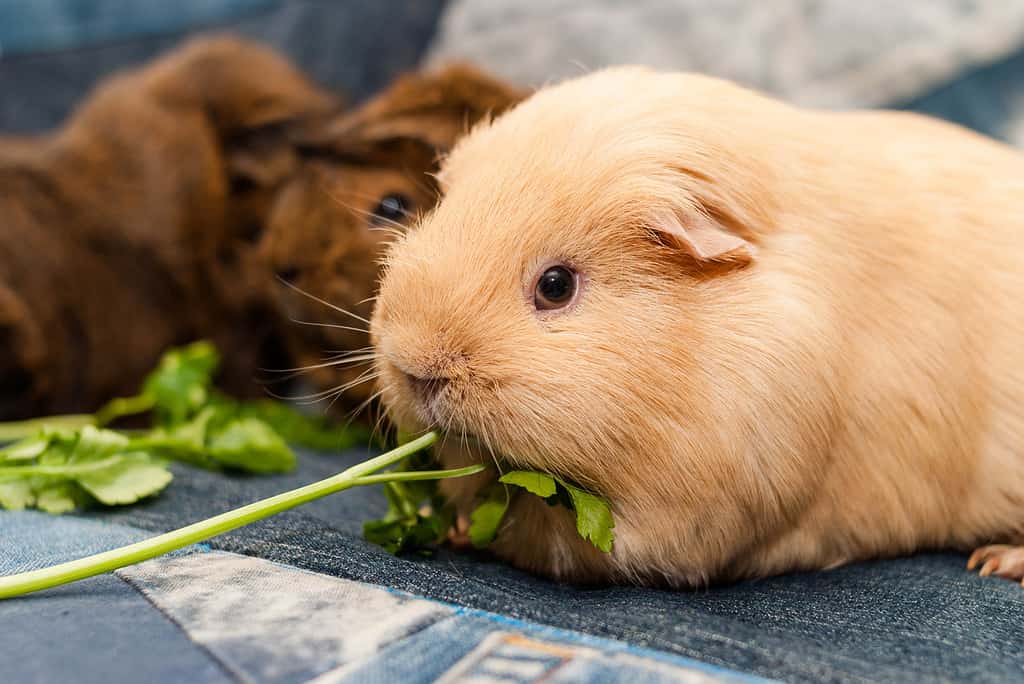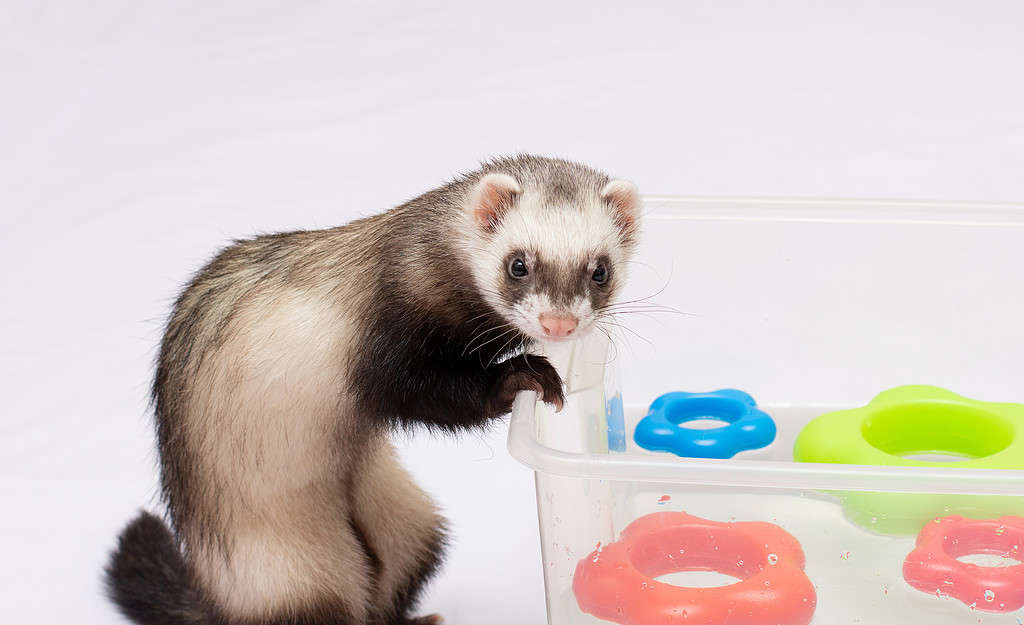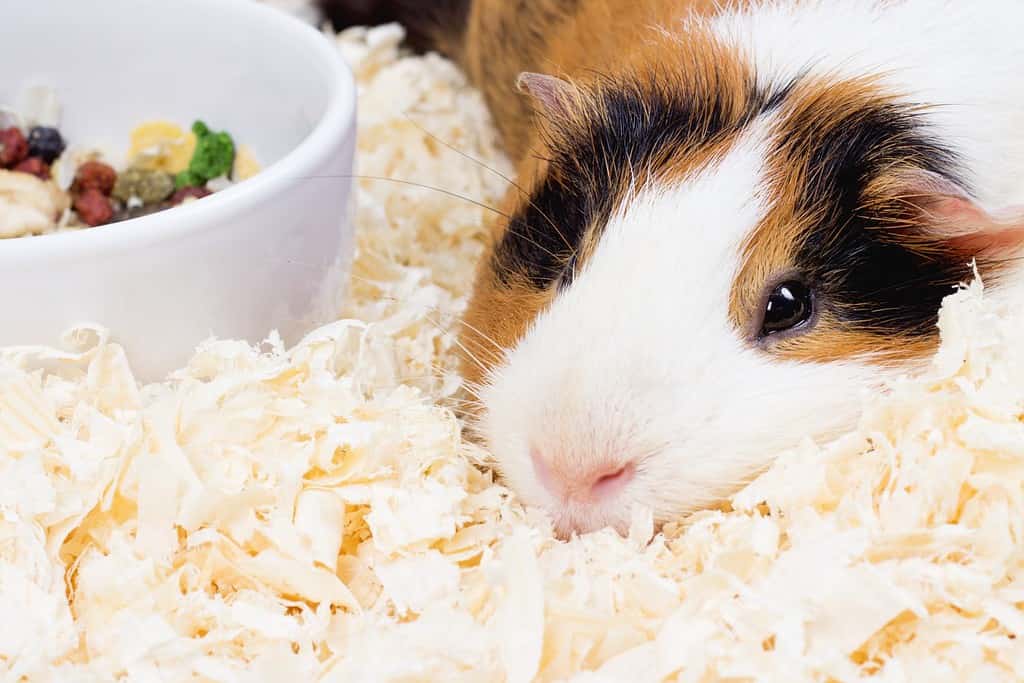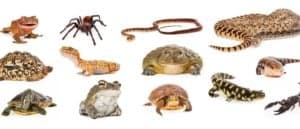Guinea pigs and ferrets are both small exotic pets that live around five to ten years on average. They’re also social creatures and must be kept with others of the same species. However, this is where their similarities end. So, what are the differences between guinea pigs vs. ferrets?
Ferrets are much more active and playful than guinea pigs. They’re predator animals, while guinea pigs are prey. Guinea pigs need large, flat enclosures to run around in, while ferrets need more climbing space.
In this article, we’ll discuss the differences between guinea pigs vs. ferrets and whether the two can live together.
Guinea Pigs vs. Ferrets: Diet

Ferrets are obligate carnivores, while guinea pigs eat solely plant matter.
©Sofiia Petrova/iStock via Getty Images
Guinea pigs and ferrets have very different diets. Guinea pigs are herbivores, meaning they eat plant matter. Ferrets are obligate carnivores, which means they must have meat in their diet.
Guinea pigs also have very fast digestive systems and must be eating constantly to avoid an illness called gastrointestinal (GI) stasis. They need constant access to grass hay without exception.
They also need about a cup of daily vegetables (primarily dark, leafy greens) and a small amount of quality guinea pig pellets. Since they don’t produce their own vitamin C, it’s essential to feed your guinea pig veggies that contain high amounts of it, such as bell peppers.
Ferrets do produce their own vitamin C, so they don’t necessarily need it supplemented in their diet. Ferrets eat ferret kibble, similar to dogs and cats. They can also have treats such as scraps of cooked, unseasoned meat.
Guinea Pigs vs. Ferrets: Litter Training
Guinea pigs will never consistently use a litter box. As we discussed above, they’re constantly eating–which means they’re also constantly pooping.
You can make cage cleaning easier by keeping a litter box or “kitchen” area filled with hay and guinea pig-safe bedding. They’ll use this while they eat, and it will reduce the pee and poop you see in their cage.
On the other hand, ferrets can be reliably litter-trained, though it takes time and patience if they’ve never used a litter box before.
Guinea Pigs vs. Ferrets: Temperament

Ferrets are more playful than guinea pigs.
©Irina Vasilevskaia/iStock via Getty Images
Guinea pigs are known for their docile personalities. They need plenty of space to exercise, and you’ll see them run around and popcorn (jump into the air) when they’re happy! However, they aren’t the most playful or rambunctious.
Ferrets are the opposite! They’re known for their mischief, love to steal items left within their reach, and are incredibly playful.
Guinea Pigs vs. Ferrets: Cage Requirements
Guinea pigs require a large, flat space. While their cages can have loft areas, the first floor should be at least 7.5 square feet–the ideal is 10.5 square feet or larger. The more guinea pigs you adopt, the more space they’ll require.
Ferret cages are multi-level and should be at least 3 feet wide, 3 feet deep, and 2 feet high. As with guinea pigs, there is no maximum size–the bigger, the better!
Ferrets need much more time outside of their cages than guinea pigs. Guinea pigs can be happy in their enclosures all day so long as they’re large enough, but ferrets require a minimum of 4 hours outside of their cage daily in a ferret-proofed play area. Remember that this is the bare minimum, and you should always aim for more.
Guinea Pigs vs. Ferrets: Odors and Clean Up

Guinea pig cages must be cleaned daily.
©Mr.Alex M/Shutterstock.com
Ferrets have scent glands and oils in their skin that produce odors. Descenting your ferret won’t prevent this and is incredibly inhumane. Bathing also doesn’t prevent the odor and can actually do more harm than good–meaning, if you adopt a ferret, you’re stuck with the ferret smell.
The good news is that ferrets don’t poop like guinea pigs! Though their poops might be smellier, you can easily remove them by scooping the litterbox. Cage cleans will be easier and less frequent if your ferret is litter-trained than for guinea pigs.
Guinea pigs shouldn’t smell if their cage is kept clean, but their clean-up is a lot of work! The cage must be spot-cleaned daily, which consists of sweeping or vacuuming any poop and removing saturated bedding. At least once a week, you’ll need to remove and wash their bedding and wipe down the entire cage.
Can Guinea Pigs and Ferrets Live Together?
Something guinea pigs and ferrets have in common is that they’re both social animals and must have same-species companions. Human interaction is never enough to make up for not living with their own kind.
This leaves some people wondering if you can keep one ferret and one guinea pig housed together instead. The answer to this is no, absolutely not!
Ferrets are predators, while guinea pigs are prey animals. Your ferret is very likely to hurt your guinea pig. Even ferret play will be too rough for a piggy companion.
Ferrets can also carry diseases that can make guinea pigs sick. If you have both animals, you should always wash your hands between interactions with them and avoid sharing items between them.
Lastly, ferrets and guinea pigs have very different diets, and it may be difficult to keep them out of each others’ food. They have different cage requirements as well, as we discussed above.
Thank you for reading! If you have feedback on this post, please contact the AZ Animals editorial team.
The photo featured at the top of this post is ©
Thank you for reading! Have some feedback for us? Contact the AZ Animals editorial team.






